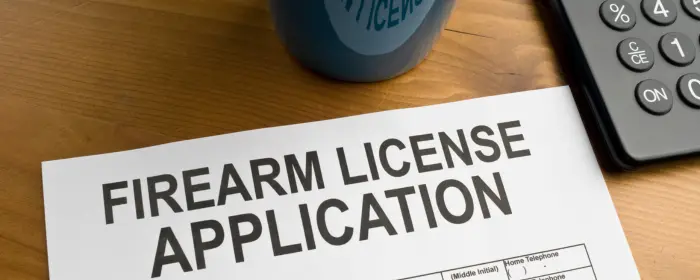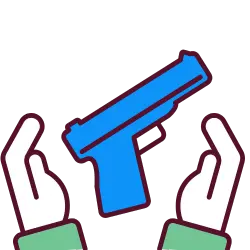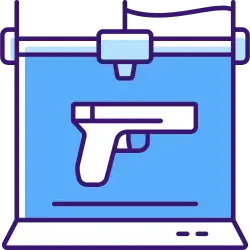
TABLE OF CONTENTS
- Getting a Wisconsin FFL: An Introduction
- Step 1: Meet All of the FFL Requirements
- Step 2: Select the Type of FFL you Need
- Step 3: Complete an Online FFL Course (Optional)
- Step 4: Apply for Your Wisconsin FFL
- Step 5: Have an Interview with a Representative from Your Regional ATF Office
- FFL License Costs in Wisconsin
- Getting a Federal Firearms License in Wisconsin: Closing Thoughts
- FFL Wisconsin FAQs
If you’re interested in owning or purchasing a firearms business in Wisconsin, getting an FFL is the first requirement. It can be challenging to begin, especially in this industry, but we will guide you through the process. You’ll learn about the types of FFL Wisconsin licenses, the specific requirements, what an FFL license costs in Wisconsin, and answers to frequently asked questions.
Getting a Wisconsin FFL: An Introduction

Before starting the licensing process for your firearms business, you’ll need to know what an FFL is.
According to the ATF, the Bureau of Alcohol, Tobacco, Firearms, and Explosives (BAFT&E) and the “Federal Firearms Licensing Center (FFLC) issue and renew federal firearms licenses (FFL) under the Gun Control Act of 1968.”[1]ATF. “Firearms.” Accessed April 08, 2024.
An FFL, or Federal Firearms License, is a license that allows an individual or company to manufacture, import, or sell firearms or ammunition. It’s a federal license and the federal “bare minimum” requirement nationwide. However, each state and local government can add restrictions or requirements above and beyond the federal. Before you start your business, understanding the gun laws by state vs. federal law can help you avoid unnecessary legal action and consequences.
Let’s start by looking at this bill and some Wisconsin FFL requirements you must follow to start your business.
Step 1: Meet All of the FFL Requirements
To obtain your Wisconsin FFL, you must meet Federal, state, and local/zoning requirements. Each level directly affects your firearms business in Wisconsin.

Federal requirements
The federal requirements for getting an FFL are the same for all 50 states. FFLs are federally regulated by the ATF and the BAFT&E.
Business owners must obtain a federal firearms license (FFL) in their state, have a clean background check, be 21 or older, be U.S. citizens, and be legal permanent residents dependent on their state.

State requirements
In most states, there is a second layer of requirements that tends to fall into two categories:
- Additional state licensing
- Business registration
You’ll need to register your business to operate in any state nationwide. Additional state licensing requirements vary and can cause issues for FFL hopefuls when starting a new firearms business.
When it comes to getting an FFL in Wisconsin, it’s a relatively easy state (compared to others), as they do not require additional licensing. What Wisconsin does differently from other states is that it brings the Crime Information Bureau (CIB) into the picture. [2] Wisconsin Department of Justice. “Crime Information Bureau.” Accessed April 08, 2024.
In Wisconsin, all FFL dealers are required to call the CIB handgun hotline before each sale of a handgun. The CIB will complete a background check on the buyer within five days. FFL dealers will then receive a verification number that allows or denies the sale of a handgun. This is part of Wisconsin Statute 175.35, which requires a NICS background check to sell all firearms. [3]Wisconsin Legislature. “Purchase of Handguns.” Accessed April 08, 2024.
Due to state statutes, Wisconsin does not have specific licensing requirements, but additional operating requirements, such as background checks, will exist.

Local and zoning requirements
To start a firearms business, you must adhere to local and zoning requirements. In Wisconsin, these requirements can differ depending on your city.
Once you register your business, check your planned business location’s zoning requirements. This is especially important for home-based FFLs. These are usually trickier than retail locations, as having a firearms business in a residential area can be controversial. So, you must ensure you can get zoning taken care of with the local government before applying for an FFL.
Step 2: Select the Type of FFL you Need
Your business model determines your license type. Then, the primary consideration is whether your business involves the manufacturing, selling, and/or importing of firearms or ammunition. Once you decide on your niche, you must choose which type of FFL suits your business best. There are nine different FFLs, and each is required for certain companies.

FFL license types
There are nine types of FFLs. FFL license types are federally regulated. Here are the options available no matter what state you reside in.
Step 3: Complete an Online FFL Course (Optional)
Learning federal, state, and local laws is extremely important when starting a business in the firearms industry. One way to ensure you know the ins and outs is to complete an online FFL course. You can easily google Wisconsin FFL courses to see various options and choose which is best for your business. A vast range of knowledge can help your business succeed by helping you avoid legal trouble.
Step 4: Apply for Your Wisconsin FFL
After you’ve selected a business model, chosen the FFL you need, and have (optionally) completed an online FFL course, it’s time to apply. To apply for your Wisconsin FFL, you must pay the application fee and wait for a response.
After receiving your application, the ATF will conduct a background check on all pertinent “responsible persons” associated with your business. This encompasses individuals listed as owners, partners, managers, etc.
Step 5: Have an Interview with a Representative from Your Regional ATF Office

Lastly, before receiving your FFL, you will have an interview with an Industry Operations Investigator (IOI). This happens once your submitted application has been reviewed and your background check has been completed. The state of Wisconsin will dispatch an IOI to go over your application in detail.
This essential interview aims to ensure your business model is sound, you have learned all Wisconsin FFL requirements, and your business is in a safe location. After the meeting, the IOI will assemble a report and send it to the ATF, recommending that your application be approved or denied.
FFL License Costs in Wisconsin
FFL license costs in Wisconsin can range from $30 to $3,000, depending on the type of FFL you are applying for. The most common FFLs cost between $30 and $200, but advanced and specific licenses can be more costly. The federal government sets these costs, so they are not state-specific.
Getting a Federal Firearms License in Wisconsin: Closing Thoughts
Starting a firearms business and obtaining a Federal Firearms License (FFL) in the United States can be a daunting task, but Wisconsin offers a relatively straightforward path. With no additional state licensing and generally lenient local requirements, Wisconsin is a great location for firearms entrepreneurs.
Additionally, finding a reliable payment processing partner is key to success in this sector, and PaymentCloud can help. We specialize in providing merchant accounts for firearm businesses and other high-risk businesses, ensuring that credit card processing is streamlined and secure. With the right resources and support, navigating the process of starting a firearms business in Wisconsin can be both manageable and rewarding.
High-Risk Businesses Wanted
Your troubles of getting approved are over!
Satisfaction
FFL Wisconsin FAQs
Here is a list of the most frequently asked questions about obtaining an FFL in Wisconsin.
Do I need an FFL in Wisconsin?
Yes, in all 50 states, you need an FFL to start a firearms business. FFLs are federally regulated, so it is necessary to have an FFL if you wish to sell, manufacture, or import firearms or ammunition.
Who can apply for an FFL in Wisconsin?
The federal government requires you to be at least 21, have a clean background, and be a U.S. citizen or permanent resident to apply for an FFL.
Do I need to register as a business to get a Wisconsin FFL?
To get a Wisconsin FFL, you must register your business with state and local governments and follow all Wisconsin FFL regulations.
How can I find an FFL dealer in Wisconsin?
There are many ways to find an FFL dealer in Wisconsin. One way is to check the directory on the website of the Bureau of Alcohol, Tobacco, Firearms and Explosives (ATF). This directory will list all dealers currently licensed by the ATF. Another way to find a dealer is to ask local gun shop owners or shooting range owners. Often, these businesses will have a list of recommended dealers they can give their customers.
Can you have a home-based FFL in Wisconsin?
Yes, you can have a home-based FFL in Wisconsin. However, you must check with the local government and zoning department to ensure your home is suitable for running your business. This can get tricky, so speak with the zoning department before proceeding.
Can I apply for an FFL with a Wisconsin gun trust?
A trust is not a person or business, so the answer is no. You must go through the formal FFL application process as an individual or company.
Does the BATF&E have requirements for an FFL in Wisconsin?
Yes, the BATF&E or ATF has federal regulations for Wisconsin. The ATF is a part of the federal government, and it has the same requirements for FFLs in all 50 states.
Do I need to apply for a SOT for my Wisconsin FFL?
Depending on the nature of your business, you may need to apply for Special Occupational Taxpayer (SOT) status. If your firearm business involves items such as silencers, machine guns, or explosives, then obtaining SOT status is necessary. This extra requirement is due to the National Firearms Act. [4]ATF. “National Firearm Act.” Accessed April 08, 2024. You can apply for SOT status after obtaining your FFL number.
How long does it take to get your FFL in Wisconsin?
Once the application has been submitted, you should know your results within 60 days.
How can I transfer an FFL in Wisconsin?
You cannot transfer your FFL in Wisconsin. The FFL stays with the applicant. For example, if you sell your business, the buyer will have to go through the same FFL application process you went through. This ensures all FFL owners have passed the federal requirements and know local and state regulations.
How much does an FFL transfer cost in Wisconsin?
This will depend on the firearm you are transferring and the company you choose to transfer through. However, a firearm transfer typically will cost between $20 and $200.
How hard is it to get an FFL in Wisconsin?
Wisconsin is a gun-friendly state that has imposed no additional licensing requirements in addition to the federal ones. If you are interested in starting a business in the firearms industry, Wisconsin is a great place to do it.



